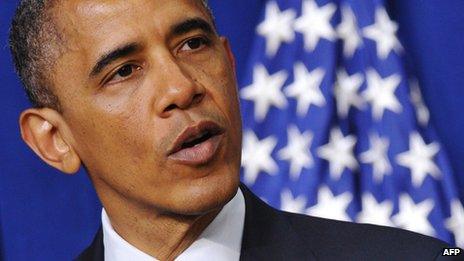Scars of Iraq war haunt US policy in Syria
- Published

"Maybe the kids will make the difference", US Senator Lindsey Graham reflected yesterday after seeing the shocking images of dead toddlers from Syria.
But those who are hoping that the events around Houla might prove to be a tipping point in prompting international intervention are likely to be disappointed, and it is worth looking at the role of the United States in this.
The Washington voices in favour of intervening forcefully to protect the Syrian people are only too well known to Barack Obama - notably senators Graham, John McCain, and Joseph Lieberman.
All three fought battles with the president when he was serving on the Senate Armed Services Committee about the war in Iraq and the American troop surge in that country.
They were vindicated in that the increase of US forces did allow Iraq to be brought back from the brink of civil war, and a more or less graceful US exit from that country.
President Obama though can hardly be bothered about getting it wrong in this earlier battle as he fights for his second term in office - in fact it may even help him that the only people arguing energetically on the Hill for intervention in Syria are hawks with these credentials on Iraq.
Mitt Romney, Republican challenger, has accused Mr Obama of weakness over Syria and vacillation, but his own formula is one simply of stepping up assistance to the opposition rather than attacking the Assad regime with US forces.
The White House explicitly rejected Mr Romney's idea and other military options yesterday.
Intelligence reports that hundreds of Sunni jihadists from across the Middle East have joined the fight against Bashar al-Assad's minority Alawite regime are also causing some in Washington to think long and hard about lining up in the same side as al Qaeda.
In this electoral season though, such nuanced considerations of realpolitik seem to be playing less of a role than simple politics.
It is the absence of calls for action from the president's Democrat base that mean he is not under any serious pressure to change his stance.
It is all reminiscent of the mid-1990s and President Clinton's reluctance to act in Bosnia or Rwanda.
Those who favour a more muscular US approach took heart from comments earlier this week from General Martin Dempsey, Chairman of the Joint Chiefs of Staff, that the military option, "should be considered".
Interestingly though, he added, "we will be prepared to provide options if asked to do so".
Rather than suggesting the White House might be considering intervention, my reading of Gen Dempsey's comments is that the Pentagon has not yet been asked to prepare plans for strikes against Syria (the "if asked" is critical) and that he thinks they ought to be considering such action.
Gen Dempsey therefore appears to have lined up with those senators mentioned earlier.
An alignment between these politicians and such men as Gen Dempsey and perhaps indeed David Petraeus, now running the CIA but formerly commander in Iraq, would come as no surprise to Mr Obama.
Both generals held senior positions in Iraq during the surge there, and must have been grateful for the support of senators Graham, McCain, and Lieberman when so many others, including Senator Obama, thought they were wasting time, money, and lives by fighting to turn the situation around.
Once again then the thread of Iraq emerges in how key players in Washington are processing the Syrian question.
Foreign policy wonks prefer comparison with Libya, where the US joined in the air campaign without getting enmeshed on the ground.
State Department or White House spokesmen have answers too for "why Syria is not Libya", but in truth last year's north African intervention was so painless that the American public largely seems not to have noticed that it happened.
Instead there is the divisive memory of Iraq, with all its shame, loss, and expense.
It means that the White House is averse to the whole question of Syria, and that could prevent France or the UK getting any traction in the UN Security before the difficult issue of getting China or Russia on board has even been broached.